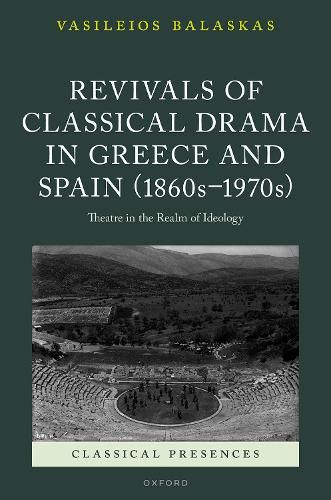Readings Newsletter
Become a Readings Member to make your shopping experience even easier.
Sign in or sign up for free!
You’re not far away from qualifying for FREE standard shipping within Australia
You’ve qualified for FREE standard shipping within Australia
The cart is loading…






Vasileios Balaskas explores the revival of classical drama at ancient venues as a sociopolitical apparatus of the European nation-states in the nineteenth and twentieth centuries. The modern use of Graeco-Roman theatres, odeons, amphitheatres, and stadiums depended on social or artistic influences and interconnections. In particular, the Spanish and Greek cases developed in parallel and addressed similar sociopolitical concepts, while the Italian example served as a model for their theatrical tradition in the first decades of the twentieth century. In theatrical terms, this book argues that the repertoire and orientation of classical drama were influenced by (inter)national artistic trends, while power relations among theatrical directors, actors and actresses, companies, and institutions determined the course of these artistic traditions. Staging classical drama in Greece and Spain transformed Graeco-Roman venues into sociopolitical powerhouses that generated collective narratives, theatrical modernization, and economic development. Despite the distinct degree of ideological engagement with classical culture, political conditions in Greece and Spain during the nineteenth and twentieth centuries offer a space for reflection and critical comparison. In this context, this study discusses how historical realities led to the staging of classical drama at Graeco-Roman venues and how each country appropriated and showcased this classical heritage as sociopolitical capital.
$9.00 standard shipping within Australia
FREE standard shipping within Australia for orders over $100.00
Express & International shipping calculated at checkout
Vasileios Balaskas explores the revival of classical drama at ancient venues as a sociopolitical apparatus of the European nation-states in the nineteenth and twentieth centuries. The modern use of Graeco-Roman theatres, odeons, amphitheatres, and stadiums depended on social or artistic influences and interconnections. In particular, the Spanish and Greek cases developed in parallel and addressed similar sociopolitical concepts, while the Italian example served as a model for their theatrical tradition in the first decades of the twentieth century. In theatrical terms, this book argues that the repertoire and orientation of classical drama were influenced by (inter)national artistic trends, while power relations among theatrical directors, actors and actresses, companies, and institutions determined the course of these artistic traditions. Staging classical drama in Greece and Spain transformed Graeco-Roman venues into sociopolitical powerhouses that generated collective narratives, theatrical modernization, and economic development. Despite the distinct degree of ideological engagement with classical culture, political conditions in Greece and Spain during the nineteenth and twentieth centuries offer a space for reflection and critical comparison. In this context, this study discusses how historical realities led to the staging of classical drama at Graeco-Roman venues and how each country appropriated and showcased this classical heritage as sociopolitical capital.